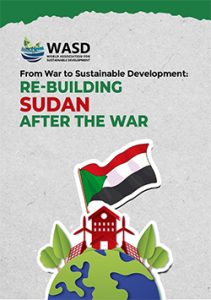(17) Transforming Sudan’s War-Torn Cities: A Sustainable Rebuilding and Recovery Framework, Sara Elhussein

 Sara Elhussein
Sara Elhussein
Architect and Senior Sustainability Consultant
I Design, London
United Kingdom
ORCID: 0009-0006-0824-3527
Paper Type: Conceptual
Received: 8 May 2025 / Revised: 19 May 2025 / Accepted: 20 May 2025 / Published: 18 June 2025
DOI:
Purpose: In the wake of Sudan’s war, which has displaced over 14 million people and devastated major cities and cultural landmarks, this paper investigates the urgent need for a sustainability-led recovery model. It presents a Sustainable Rebuilding and Recovery Framework (SRRF) to address Sudan’s deep-rooted urban vulnerabilities and promote an inclusive, climate-resilient transformation based on the country’s environmental, cultural, and socio-economic context.
Design/methodology/approach: The study employs a multidisciplinary methodology combining policy review, architectural case studies, stakeholder insights, and best practices in post-war reconstruction. The SRRF offers a structured roadmap built on six key pillars, each addressing a vital dimension of recovery. The framework aligns with the Sustainable Development Goals (SDGs) and Build Back Better (BBB) principles and provides practical tools for local urban transformation.
Findings: The framework proposes key strategies such as low-carbon infrastructure, decentralised public services, community-led housing, renewable energy adoption, circular economy principles, and integration of cultural heritage in urban planning. The findings emphasize the critical role of inclusive governance and climate-adaptive design in building long-term resilience and preventing the repetition of past planning mistakes.
Originality/value: This paper offers a recovery model uniquely adapted to Sudan’s realities. It contributes a locally grounded, globally relevant approach to sustainable urban reconstruction and serves as a replicable reference for other conflict-affected regions facing similar rebuilding challenges.
Research limitations/implications: The study emphasizes strategic frameworks over field-based data collection. Additional research is necessary to assess on-the-ground implementation, economic viability, and policy effects. The framework presents a transferable model that could be tested and adapted in other post-conflict contexts with comparable challenges.
Practical implications: The SRRF provides government agencies, architects, planners, and development partners with a coherent roadmap for rebuilding climate-resilient, economically inclusive, and culturally rooted cities.
Keywords: Post-War Reconstruction; Sustainable Urban Development; Climate Resilience; Cultural Heritage Preservation; Renewable Energy; Sustainable Architecture; Circular Economy; Disaster Risk Reduction; Inclusive Urban Planning; Sudan Rebuilding Framework.
Citation: Elhussein, S. (2025): Transforming Sudan’s War-Torn Cities: A Sustainable Rebuilding and Recovery Framework. In Ahmed, A. (Ed.): From War to Sustainable Development: Rebuilding Sudan after the War, Vol 1, pp. xx-xx.

